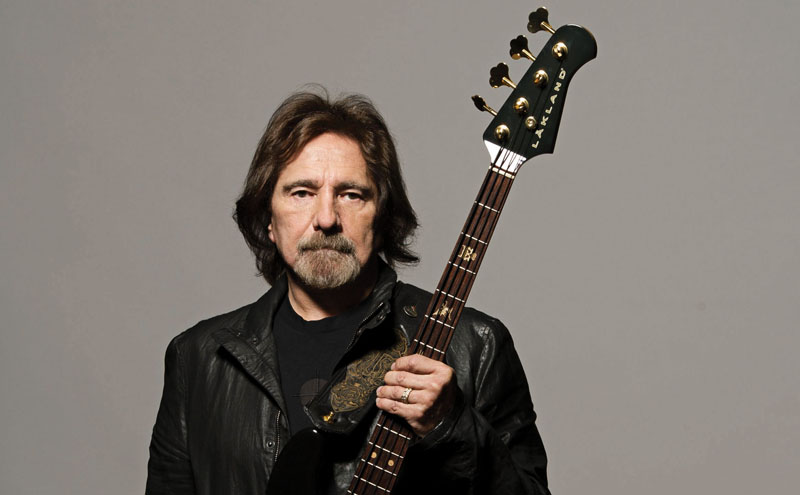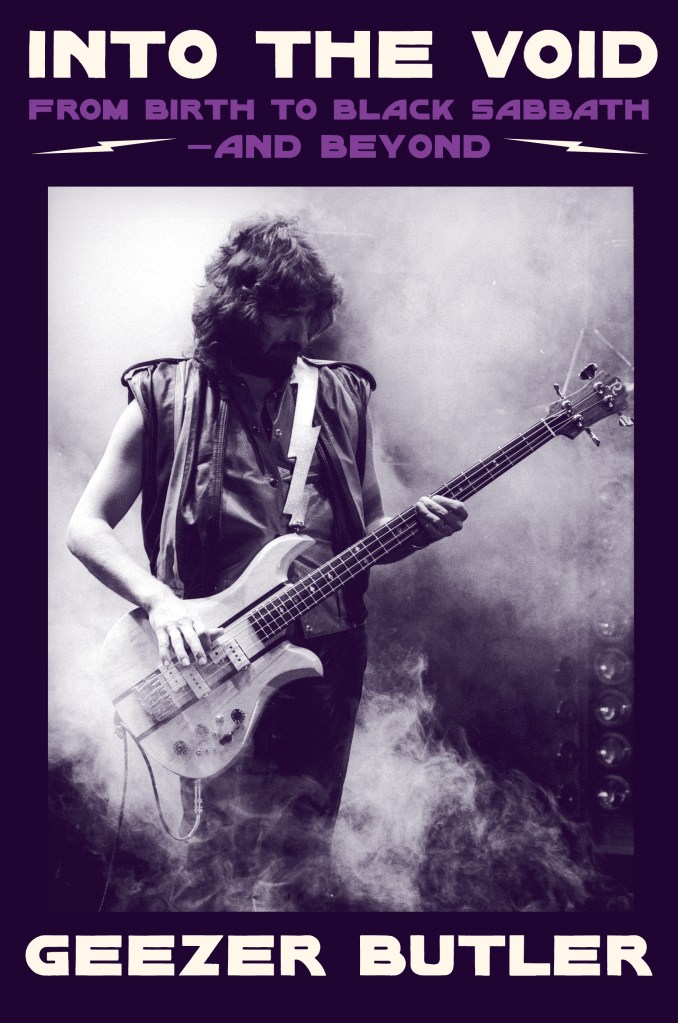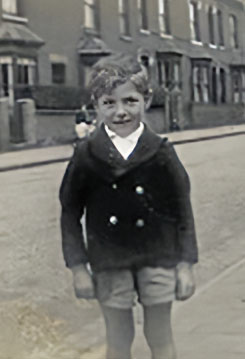
The song opens unlike anything else that had been heard in rock music to date. The sounds of a howling wind, drizzling rain, thunder, and then the slow, repetitive tolling of a bell. Just when you think it’s a Halloween sound effects record, instruments kick in—most prevalent the deep notes of an ominous, eerie guitar. Then, the vocals of a seemingly unhinged and unbelieving narrator.
“What is this that stands before me?/Figure in black which points at me/Turn ‘round quick and start to run/Find out I’m the chosen one…Oh Nooooooooo!”
The song is “Black Sabbath.” The lead track off Black Sabbath. The 1970 debut record by…Black Sabbath (there’s something to be said for repetition in marketing). Its lyrics were mainly written by the band’s bassist, Terence “Geezer” Butler, based on an actual vision he had one night and whose title was inspired by the 1963 horror anthology film featuring Frankenstein himself, Boris Karloff.
And while Black Sabbath didn’t singlehandedly “invent” a new form of music known as heavy metal with Classic Rock Warhorses like “Paranoid,” “Iron Man,” “Into the Void,” “War Pigs,” “Children of the Grave,” and “Sabbath Bloody Sabbath,” they were certainly one of the Founding Fathers.
With a career spanning decades, commercial and critical highs and lows, an interchangeable lineup, and a body of work that still inspires and horrifies listeners today.
Butler tells the hang-on-to-your-seats story of his life, his band, and his music with unusual candor in the new memoir Into the Void: From Birth to Black Sabbath—and Beyond (288 pp., $29.99, William Morrow).
“The original book was about 500 pages long. But when we sent it to the publisher, they said ‘Oh, you can’t say that!’” Butler says on the phone from his California home. “And I said, ‘I was in Black Sabbath—not the Osmonds!’ But unless you can prove something happened with letters or whatever, it couldn’t go in the book. They were afraid of getting sued!”
For much of his time in the group from the start (though there were some hiatuses), Butler was their chief lyricist. As he writes, the band would often have the music portion formed, with singer Ozzy Osbourne making up words of the top of his head to the melody. Butler would keep some of them, but mostly put his own spin and themes into it. Since the band agreed to split credits among the four (including guitarist Tony Iommi and drummer Bill Ward), all contributed in some way, though Iommi’s riffs were often the genesis.
But toward the end of the [original lineup’s first] time together, he says that Osbourne started losing interest in Buter’s words. “He wouldn’t even read them! And when [Osbourne’s replacement after he was fired] Ronnie James Dio came in, he could write his own lyrics.”
Butler covers his early life in the very working-class area of Birmingham, England in a strict Irish Catholic family. The gloominess and drudgery of the surroundings (and not just that infamous English weather) definitely influenced both him and his future Sabbath bandmates. Even as they tried to find their musical way in early versions with names like The Polka Tulk Blues Band (??) and Earth.
Central to the band’s image and music were themes of the occult, horror, black magic and Satanism—all early interests of Butler. Though, as he writes, there’s a considerable gap between showing curiosity or interest in something and actually becoming involved with it.
“It was one of those passing fads you go through as a teenager. But as a strict Catholic, I was hearing about hell and Satan all of the time already. [My interest] was like a going against your parents sort of thing,” Butler says.
“Then horrible things started happening to me and I blamed it on me getting into black magic. So, I quit it. That’s where the song ‘Black Sabbath’ came from. Don’t get involved what you don’t have control over! But it wasn’t a glamorous place where we grew up. And the music reflected that.”
Black Sabbath was notorious for shifting lineups and questionable holds on the name after Osbourne was fired from the band in 1979. Even among a group of heavy drinkers and drug abusers, Ozzy was especially out of control. And the appeal of “fun” antics like him taking a full-on shit in the elevator of a busy hotel were growing thin among his band mates and management.
The book is full of wild tales and stories, like the recording of Vol. 4, where Butler says they spent more money on cocaine than actual recording costs. Or when they first came to America and asked a perplexed cab driver where they could find “10 fags…preferably English ones” and if there were a “gift shop” nearby they could get some. “Fags,” of course, at the time was perfectly acceptable English slang for cigarettes.
And how does a boy christened Terence end up being known for most of his life as Geezer? Well, it turns out that in Birmingham, the phrase “Alright, geezer?” is the English equivalent of “What’s up, dude?” on these shores.
Second singer Ronnie James Dio quit (or was fired) after creative and management struggles. Butler did mend fences with him and in the 2000’s successfully toured and recorded as Heaven and Hell with the Heaven and Hell/Mob Rules lineup of Dio, Iommi, Butler, and drummer Vinny Appice. The quartet chose not to fly under the “Black Sabbath” name for fear of litigation from Osbourne’s formidable wife/manager, Sharon.
Butler and his wife, Gloria, would also frequently socialize with Dio and wife Wendy. And the Butlers accompanied the Dios to Houston when Ronnie sought treatment for stomach cancer at MD Anderson hospital. The rapidly-forming disease would eventually kill him in 2010.
“Ronnie and I had our ups and downs in the band. But outside of the business and outside of music, Ronnie and Wendy were really good friends of ours,” Butler says. “He was really scared. Up until that time he thought it was just a stomachache. And when he got diagnosed, the best place in America to go for cancer treatment was Houston. I’m really glad that we went with him and checked him in.”
Black Sabbath made one final record, 2013’s 13, started a final world tour dubbed “The End” in 2016, and wrapped up their career with two final shows at the Genting Arena in their hometown of Birmingham. Onstage were Osbourne, Butler, Iommi, and…Tommy Clufetos on drums.
Founding member Bill Ward declined to take part in the tour after publicly stating he’d been given and “unsignable contract” by Sharon Osbourne and band management, likely involving his compensation. Barbs were traded in the press for months.
In Into the Void, Butler muses that perhaps the contract was deliberately meant to fall not in Ward’s favor as a way to eliminate his involvement (there were questions if the drummer—who had a series of physical ailments over the years—could handle the strenuous job). Butler says he has no inside information and doesn’t know what the contract terms were.
“We asked him if he’d do two or three songs a show or whatever he felt comfortable doing. And he said he’d do the whole show or nothing at all. And I totally respect that. If they told me to do two or three songs on bass and go away, I’d have told them where to go!” Butler says. “All I know is Bill was in the band, then me and my wife went to Hawaii for a week, and when we got back, Bill wasn’t in the band anymore.”
Finally, Into the Void makes a nice circular round when Geezer Butler proudly watches his own granddaughter play none other than Black Sabbath’s “Iron Man”—at her Catholic school no less. Well, Butler does write that the song was at least partially inspired by the thought of Jesus Christ coming back. Though not in a particularly happy or forgiving mood.
“She had the whole school choir singing it!” Butler laughs. “That was very strange for me. I thought people would be looking at me as if I was the devil or something!”
This interview originally appeared at HoustonPress.com



